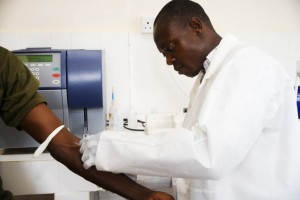(ThyBlackMan.com) Learning that you have cancer can come as a shock. How do you react? You may feel numb, frightened, or angry. You may not even believe what the doctor says. You may feel all alone, even if your friends and family are in the same room with you. These feelings are all normal.
For many people, the first few weeks after a cancer diagnosis are very hard. After you hear the word “cancer,” you may have trouble breathing or listening to what is being said. When you are at home, you may have trouble thinking, eating, or sleeping.
If you’re like most people, you’re clueless about cancer.
Let’s see if we can change that…
Cells are the building blocks of living things. Cancer grows out of normal cells in the body. Normal cells multiply when the body needs them, and die when the body doesn’t need them. Cancer appears to occur when the growth of cells in the body is out of control and cells divide too quickly. It can also occur when cells “forget” how to die.
The body is made up of hundreds of millions of living cells. Normal body cells grow, divide, and die in an orderly fashion. During the early years of a  person’s life, normal cells divide faster to allow the person to grow. After the person becomes an adult, most cells divide only to replace worn-out or dying cells or to repair injuries.
person’s life, normal cells divide faster to allow the person to grow. After the person becomes an adult, most cells divide only to replace worn-out or dying cells or to repair injuries.
Appropriate treatment for cancer depends on what kind of cancer you have. The type of cancer is determined by the organ the cancer starts in, the kind of cell from which it is derived, as well the appearance of the cancer cells. There are many different kinds of cancers. Cancer can develop in almost any organ or tissue, such as the lung, colon, breast, skin, bones, or nerve tissue.
There are over 100 different types of cancer, and the type of cell that is initially affected classifies each one. There are five broad groups that are used to classify cancer:
1. Carcinomas are characterized by cells that affects parts of the body such as lung, breast, and colon cancer.
2. Sarcomas are characterized by cells that are located in bone, cartilage, fat, connective tissue, muscle, and other supportive tissues.
3. Lymphomas are cancers that begin in the lymph nodes and immune system.
4. Leukemias are cancers that begin in the bone marrow and often accumulate in the bloodstream.
5. Adenomas are cancers that arise in the thyroid, the pituitary gland, the adrenal gland, and other glandular tissues.
Cancer harms the body when damaged cells divide uncontrollably to form lumps or masses of tissue called tumors (except in the case of leukemia where cancer prohibits normal blood function by abnormal cell division in the blood stream). Tumors can grow and interfere with the digestive, nervous, and circulatory systems, and they can release hormones that alter body function. Tumors that stay in one spot and demonstrate limited growth are generally considered to be benign.
There are many causes of cancers, including:
o Benzene and other chemicals
o Certain poisonous mushrooms and a type of poison that can grow on peanut plants (aflatoxins)
o Certain viruses
o Radiation
o Sunlight
o Tobacco
However, the cause of many cancers remains unknown.
The most common cause of cancer-related death is lung cancer.
The three most common cancers in men in the United States are:
1. Prostate
2. Lung cancer
3. Colon cancer
In women in the U.S., the three most common cancers are:
1. Breast cancer
2. Colon cancer
3. Lung cancer
Some cancers are more common in certain parts of the world. For example, in Japan, there are many cases of gastric cancer, but in the U.S. this type of cancer is pretty rare. Differences in diet may play a role.
Some other types of cancers include:
Brain cancer (—-
Cervical cancer (—-
Kidney cancer (—-
Leukemia
Liver cancer (—-
Ovarian cancer (—-
Skin cancer (—-
Thyroid cancer (—-
Uterine cancer (—-
Symptoms of cancer depend on the type and location of the tumor. For example, lung cancer can cause coughing, shortness of breath, or chest pain. Colon cancer often causes diarrhea, constipation, and blood in the stool.
Some cancers may not have any symptoms at all. In certain cancers, such as gallbladder cancer, symptoms often do not start until the disease has reached an advanced stage.
The following symptoms can occur with most cancers:
Chills
Fatigue
Fever
Loss of appetite
Malaise
Night sweats
Weight loss
Half of all men and one-third of all women in the US will develop cancer during their lifetimes.
Being diagnosed with cancer is a process. It doesn’t happen all at once. If you have just gotten word you may have cancer, probably have cancer, or even do have cancer, the type and stage of your cancer may still be unknown. In many cases, the doctors can be pretty sure of the type and stage just from the initial studies, but sometimes even the type of cancer is in question for quite some time.
Cancer treatment depends on the type of cancer, the stage of the cancer (how much it has spread), age, health status, and additional personal characteristics. There is no single treatment for cancer, and patients often receive a combination of therapies and palliative care. Treatments usually fall into one of the following categories: surgery, radiation, chemotherapy, immunotherapy, hormone therapy, or gene therapy.
A few pointers:
1. Until a pathologist has examined a sample of your tumor from surgery or a biopsy, the exact type of cancer may not be known. For cancer in a number of organs, the vast majority of cancers are of the same type. For example almost all prostate cancers are adenocarciomas and a large majority of cervical cancers are squamous cell carcinoma. The grade and other cellular factors influencing your prognosis will also not be known until a sample of your tumor is examined. In a quite a few cases this may not happen until after surgery to remove the primary tumor.
2. Before surgery to remove the primary tumor, the staging is only presumptive. The exact degree of spread is often impossible to determine until the pathologist examines the surgical specimen. The actual degree of lymph node involvement is often not known until after surgery. For some cancers, such as breast cancer, surgical procedures are done just to determine what stage your cancer is in, and/or whether the nodes are involved.
Despite these uncertainties, you can start researching the staging and treatment of the type of cancer you are suspected of having well before the final diagnosis is in. If you do, you will get far more out of your doctor visits, and you will be ready to make the important decisions ahead. Be prepared for surprises as new information comes in. Cancer is a real roller coaster, and you may have to change your direction many times before you are done.
Today, millions of people are living with cancer or have had cancer. The risk of developing most types of cancer can be reduced by changes in a person’s lifestyle, for example, by quitting smoking, limiting time in the sun, being physically active, and eating a better diet. The sooner a cancer is found and treated, the better the chances are for living for many years.
Remember, I’m not a doctor, I just sound like one.
Take good care of your self and live the best life possible!
This column is not intended to replace the proper medical advice from your doctor or other qualified medical professional.
Written By Glenn Ellis
Official website; http://www.GlennEllis.com

















It is really sad to hear when your doctor tells you that you have cancer, even more worst if it has already reached the final stage and does not have cure at all. Prevention is still better than cure, you’re right that one must maintain a healthy lifestyle. The information you provided is an overview especially for those who are still curious what cancer is. Thanks.